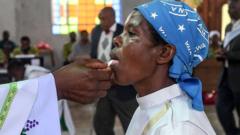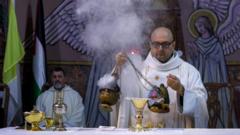As the world mourns the loss of Pope Francis, a pivotal figure in the lives of millions of progressive Christians, the question of the movement's future looms large. For 12 impactful years, he served as a beacon for the marginalized, countering a rising tide of conservative Christianity. Now, leaders such as Bishop Sean W. Rowe of the Episcopal Church are emphasizing the critical moment ahead. The movement now must find new ways to articulate its message of love and inclusivity amid a landscape where Christian language is increasingly co-opted by nationalism and divisive politics. As Bishop Rowe asserts, it’s essential to reclaim this narrative and present it compellingly to the world. The future direction of progressive Christianity now stands at a crossroads, seeking to embody the core teachings of Jesus in challenging times.
The Future of Progressive Christianity After Pope Francis

The Future of Progressive Christianity After Pope Francis
In the wake of Pope Francis's passing, progressive Christian communities face uncertainty about their future influence and direction.
The Future of Progressive Christianity After Pope Francis
In the wake of Pope Francis's passing, progressive Christian communities face uncertainty about their future influence and direction.
As the world mourns the loss of Pope Francis, a pivotal figure in the lives of millions of progressive Christians, the question of the movement's future looms large. For 12 impactful years, he served as a beacon for the marginalized, countering a rising tide of conservative Christianity. Now, leaders such as Bishop Sean W. Rowe of the Episcopal Church are emphasizing the critical moment ahead. The movement now must find new ways to articulate its message of love and inclusivity amid a landscape where Christian language is increasingly co-opted by nationalism and divisive politics. As Bishop Rowe asserts, it’s essential to reclaim this narrative and present it compellingly to the world. The future direction of progressive Christianity now stands at a crossroads, seeking to embody the core teachings of Jesus in challenging times.
In the wake of Pope Francis's passing, progressive Christian communities face uncertainty about their future influence and direction.
As the world mourns the loss of Pope Francis, a pivotal figure in the lives of millions of progressive Christians, the question of the movement's future looms large. For 12 impactful years, he served as a beacon for the marginalized, countering a rising tide of conservative Christianity. Now, leaders such as Bishop Sean W. Rowe of the Episcopal Church are emphasizing the critical moment ahead. The movement now must find new ways to articulate its message of love and inclusivity amid a landscape where Christian language is increasingly co-opted by nationalism and divisive politics. As Bishop Rowe asserts, it’s essential to reclaim this narrative and present it compellingly to the world. The future direction of progressive Christianity now stands at a crossroads, seeking to embody the core teachings of Jesus in challenging times.






















